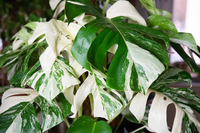Do you long for a beautiful garden but don’t have the time to look after it? Gardening doesn’t always have to be hard work. With the right choice of plants and a few clever tips, you can create a garden full of colour and interest that doesn’t require constant looking after. Here are our top 7 tips on low-maintenance gardening.

Seven tips for low-maintenance gardens

-
Pick plants that suit your garden’s conditions and will grow happily there. Don’t try to force sun-loving plants to grow in the shade or vice versa, as stressed plants are more likely to be attacked by pests and diseases, needing more care and attention from you.
-
Shrubs are ideal for low-maintenance gardens, often needing just annual pruning to keep them looking good. Try evergreen Prunus laurocerasus (laurel) for a year-round structure in the garden and deciduous shrubs like Weigela and Viburnum opulus for beautiful flowers.
-
Groundcover plants are great for suppressing weeds, and they look beautiful while doing it! Hellebores, evergreen Geranium macrorrhizum and Pachysandra terminalis make excellent groundcover plants for shady spots. In sunny beds, plant silver-leaved Stachys byzantina (lamb’s ears) or hardy geraniums like Geranium ‘Rozanne’, a prolific flowerer that just needs cutting back once a year when it starts to die back in autumn. Geranium renardii and Geranium ‘Mavis Simpson’ also make gorgeous flowering groundcover for sunny spots.
-
When planting in containers, remember that small pots dry out fast in hot weather and need frequent watering. To reduce the time and effort spent watering your pots, combine several plants in one large pot – but check first to make sure they all like the same growing conditions! Add vermiculite or water-retaining granules to the compost in hanging baskets. These retain water and release it slowly into the compost, allowing longer between waterings.
-
Even low-maintenance gardens will need some weeding, but annual weeds in flowerbeds are easily tackled with a Dutch hoe. On a dry day, run it over the soil so that the blade of the hoe cuts through the weeds just below the surface of the soil. The weeds can then be left to wither on the surface.
-
Get rid of any awkward corners on your lawn so that it is quick and easy to mow. If your garden is small, you could even get rid of the lawn altogether, replacing it with permeable paving or decking.
-
Apply a thick layer of mulch to beds in autumn or early spring when the soil is damp. This does require some effort, but the benefits are well worth it, as the mulch helps suppress weeds and keeps moisture in the soil. Annual mulching with organic material like well-rotted farmyard manure or garden compost also improves soil structure so that it retains moisture in dry periods, reducing the need to water.
Looking for more guidance on low-maintenance plants? We have a fantastic range in our centre, and our friendly staff are always happy to help. Come and see us soon!




